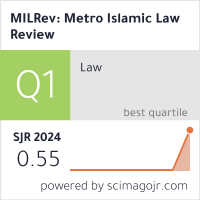Contemporary Inheritance: The Application of Inheritance Division in Juridical, Psychological, Sociological and Economic Perspective
DOI:
https://doi.org/10.32332/milrev.v2i2.8037Keywords:
Inheritance; Juridical; Psychological; Sociological; EconomicAbstract
The objective of this study is to explain the problem associated with the application of inheritance division lidzdzakari mitslu hadhdhi al-unstsayain, contemporary studies in juridical, psychological, sociological, and economic perspective. Data were collected through documentation and analyzed using the Miles and Huberman analysis method. The source triangulation method was used to validate and authenticate the data. The results obtained are as follows: firstly, juridically, the 2:1 division of inheritance has an underlying legal umbrella, named QS. An-nisa paragraph 11 and Compilation of Islamic Law (KHI) Book II on Inheritance is in accordance with article 176. However, the application varies with each community due to underlying factors. Secondly, psychologically, division of inheritance should not be done haphazardly to meet the criteria of justice for all parties to avoid conflict between families. Thirdly, sociologically, the application of inheritance is still a pro-con in society with a ratio of 2:1, which has not fulfilled the element of justice. Fourthly, economically, the 2:1 division of inheritance is firmly based on the amount of economic responsibility a man carries.










